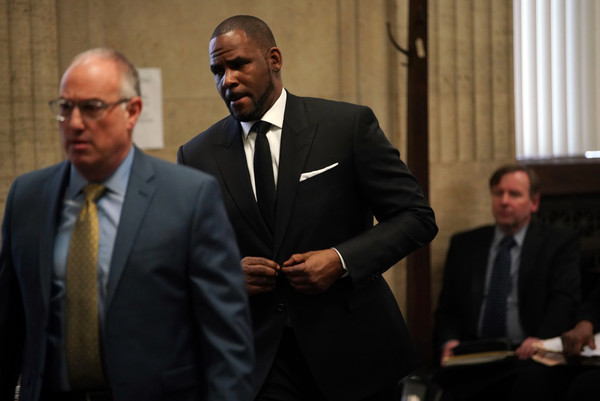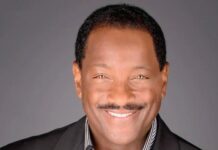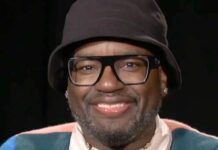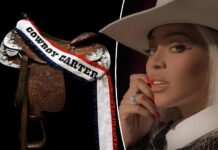
(March 21, 2019 – Source: E. Jason Wambsgans/Getty Images North America)
*Jim DeRogatis was the first reporter to investigate allegations about R. Kelly sexual misconduct with underage girls and now he’s set to dive deep into the singer’s downfall in a new book titled “Soulless: The Case Against R. Kelly.”
The book has been in the works since before Dream Hampton’s explosive six-part Lifetime documentary, Surviving R. Kelly, that premiered earlier this year. DeRogatis began covering the allegations against Kelly in November 2000, and his book chronicles this period. As noted by Fader, it also includes “foundational experiences in his own life that brought him, a “fat, white rock critic,” to interview scores of young, black women; their friends, and their families in an effort to tell the world about a man he says is “the biggest predator in the history of popular music.””
In his first interview about the book with NME, DeRogatis discusses his reluctance to write the book but notes, “Sometimes you find a story and sometimes a story finds you.”
“This book is about the girls. This book is not about this man,” he told CBS This Morning.
Below are highlights from the interview.
OTHER NEWS YOU MIGHT HAVE MISSED: R. Kelly’s New Problem: Chicago Prosecutors Charge Him with 11 Sex-Related Counts
“This book is about the girls. This book is not about this man.” — @JimDeRogatis on #Soulless pic.twitter.com/GHwPOjjiCc
— CBS This Morning (@CBSThisMorning) June 4, 2019
This book has been in the works for some time but are we right in thinking it didn’t come about because of the recent indictment?
“I never wanted to write this book. I didn’t want to live with that darkness. My agent really wanted me to write a book about R. Kelly and toxic masculinity, something a little more critical, professorial, wearing my critic and professor hat, in July or August 2017. I was reluctant. My initial idea for a book was something I’ve wanted to write for a long time about playing in bands, how all the hassle of rehearsing, hauling your gear to play at CBGB’s on a Tuesday in February at one in the morning to play for six people is the best 30 minutes of your life. A memoir of a life saved by Rock and Roll. The reason I am not a racist Jersey City cop or a prison guard or a sanitation engineer like 90 percent of the kids that I went to high school with is because of music.”
“I had this post-modern idea of two sides. A life saved by rock and roll, a life destroyed by rock and roll. The power of music to transform, the power of music as the ultimate tool to corrupt. So, I wrote like 10 or 11 versions of that book. My agent shopped it around, nobody wanted that book. Nobody was clamouring for an R. Kelly book, either. So, that took months and I was writing the whole time. I was writing side A and side B. My timing always sucks, I’m bad at selling. So I wasted months on that. If I had waited until the first week of this year to sell the Kelly book, I might have done better, but as it was there were two editors who were interested. One at Grove Atlantic who happened to go to Kenwood Academy with R. Kelly, and one at Abrams who went to Oak Park River Forest High School, where [one of the alleged victims] attended. If there hadn’t been that personal connection, them having read me for years, listened to me on the radio and a personal connection to the Kelly story.”
When R Kelly was indicted [in February], it must have seemed like good timing for the publisher.
“I don’t know how the business end of it works. I think there is also going to be a trial, I think there will be federal indictments which will be much more substantive and much more revealing because they are looking into 30 years of sex trafficking. That’s the scope of what the book is about.”
The one thing that really struck me reading the book — If I had to pick one theme from it, is that most of the people who are victims or who had knowledge of his activities felt like, ‘He is sick, he needs help,’ more than he’s crazy and/or a horrible person.
“I think for years that was true. I think that’s changed now. A lot of these women were speaking to me in isolation and I was telling their stories in isolation. I think what people are now only beginning to realise is that this took place over 30 years and involved dozens of women. Degradation at a scale, pretty much unrivalled in entertainment. Harvey Weinstein operated that way for decades and had many victims, but he was sort of in the shadows. He’s a famous producer and certainly in the industry he’s a giant, but Kelly was in the world spotlight, singing at the World Cup, singing at the Winter Olympics. This was in full view of the world.”
What’s your personal feeling about Kelly? Do you hate him?
“I don’t know if that’s a relevant emotion. I hate what he’s done to those women I’ve met and talked to. I haven’t met Reshona Landfair [the girl in the 2002 tape and one of the four victims in the current indictment]. I hate that tape. I’ve never seen anything worse in my life.”
Does any part of you feel sorry for him?
“Umm, I would have said yes midway through these 19 years, but if the first lawsuit by Tiffany Hawkins in 1996 was not enough of a wake-up call; if the indictment and acquittal was not enough of a wake-up call; obviously the sickness he has is so deeply rooted along with the egotism, the narcissism, the complete lack of morals, he’s not going to stop. He’s never going to stop. I hate that so many people have enabled him, I hate what he did to the women I’ve met. I’ve seen the evidence and now I think people are finally starting to realise it.”
I’ve heard you say that through your reporting, you’ve held the megaphone for these voiceless women who nobody cared about. In doing so, did you perhaps cross the objectivity line?
“Well, as someone who considers himself a new journalist, a literary journalist… When I say in the book that I was reading The Village Voice in the seventh grade; Tom Wolfe’s New Journalism Anthology was a sacred text to me. I can show you my first edition. I think objectivity is a ruse. I was a huge champion of the alternative press, The Chicago Reader, The New Times papers which did good work but ended up in disgrace, and The Village Voice, which was at the top of that pyramid. Was Tom Wolfe objective in The Right Stuff or The Electric Kool-Aid Acid Test? Was Truman Capote objective? What’s the title of In Cold Blood mean? There are two different sets of murders in that book, the Clutter family and state executing these people.
“Anyway, I don’t think you can be totally objective. I think you can be fair. This was not a conversation we were having at the Sun-Times. I don’t think any of those pieces qualify as ‘new journalism’ or literary journalism. The book does, the Buzzfeed articles did, but even then the laying out of the facts was always scrupulously dry because every editor I ever worked with bent over backward in order to be fair and also because we didn’t want to be sued. We never have been. Not a single word retracted, corrected or clarified, much less sued. You’re a reporter, how can you not have emotions sitting with victims and victims parents, and watching that tape. How can you not have emotions?”
You interviewed R. Kelly’s 15-year-old protegé Aaliyah in December 1995 in advance of a concert she was giving. It was six months after BET jokingly asked them both if their relationship like “girlfriend and boyfriend or cousins” and a week after VIBE published a copy of their marriage certificate that you would confirm was authentic with the Cook County Clerk’s Office. Did you have this in the back of your mind when you received the fax in 2000?
“Yes and no. There are about six other steps I could have taken [in 1995]. I write in the book about how I called the Cook County Clerk’s Office [about the marriage license] and called Reverend Nathan J. Edmond [who was listed on the marriage certificate as the officiant]. I could have tried to get her birth certificate, although in Illinois you can’t unless you’re a parent or the person. I didn’t dig that hard [in 1995]. Maybe she was lying about her age, publicists were denying that she was 15 and they were married. That was enough for every journalist in the music world. Something was fishy, but it seemed more like gossip or anything relevant to the music at the time.”
You interviewed R. Kelly twice in 1995, once briefly in person when he didn’t receive a Grammy nomination and then a longer phone interview about ‘You Are Not Alone’, a Kelly song Michael Jackson recorded that went to No.1 — ironically his first hit after his own child sex scandal. He talked about the song, saying that Michael is special because despite the stuff going on in his life, he was still able to get his message across in music. You also brought up criticism he received about misogynistic lyrics — to which he brought up the sexual lyrics of Marvin Gaye. Looking back, do you think there was more under the surface that no one really was aware of?
“It seemed that way then, when we were doing our reporting in 2000. Everybody who was close or had been close with Kelly, I was asking what was happening between those two [Aaliyah and Kelly]. It’s interesting, look at that interview. It was so long ago and there’s this business about ‘There’s R. Kelly and there’s Robert.’ And I wasn’t even the first to get that line. Now it’s crystal clear that R. Kelly is a monster and Robert is an extremely troubled, extremely troubled individual.”
You write about Kelly having numerous tapes, carrying them around in a gym bag as “trophies.”
“That’s the language that Abdon (his Chicago Sun-Times colleague Abdon Pallasch) and I got from the psychologists.”
It seems so screwed up. Why would you want to keep evidence of your own crime?
He is both shrewd and smart and stupid. I’ve got that from everybody who is close to him. That’s obviously a compulsion that he can’t stop and it’s the stupidest thing in the world.”
Read the full interview here.
“Soulless: The Case Against R. Kelly” by Jim DeRogatis was published on June 4
We Publish News 24/7. Don’t Miss A Story. Click HERE to SUBSCRIBE to Our Newsletter Now!





